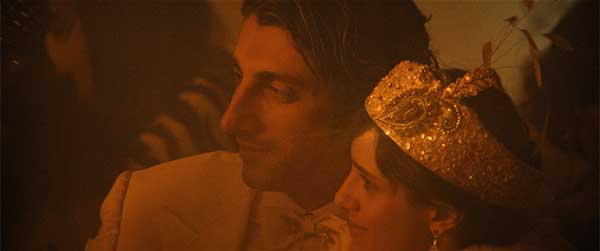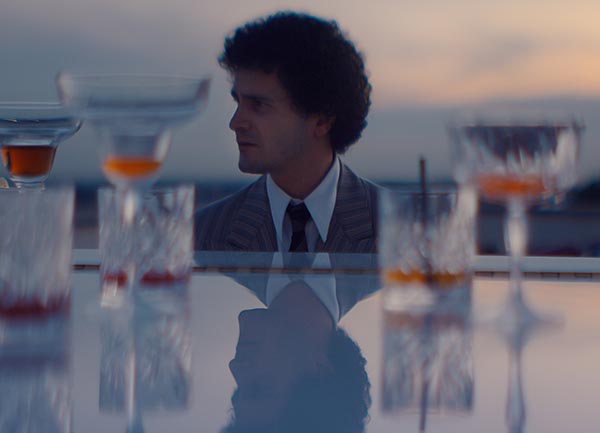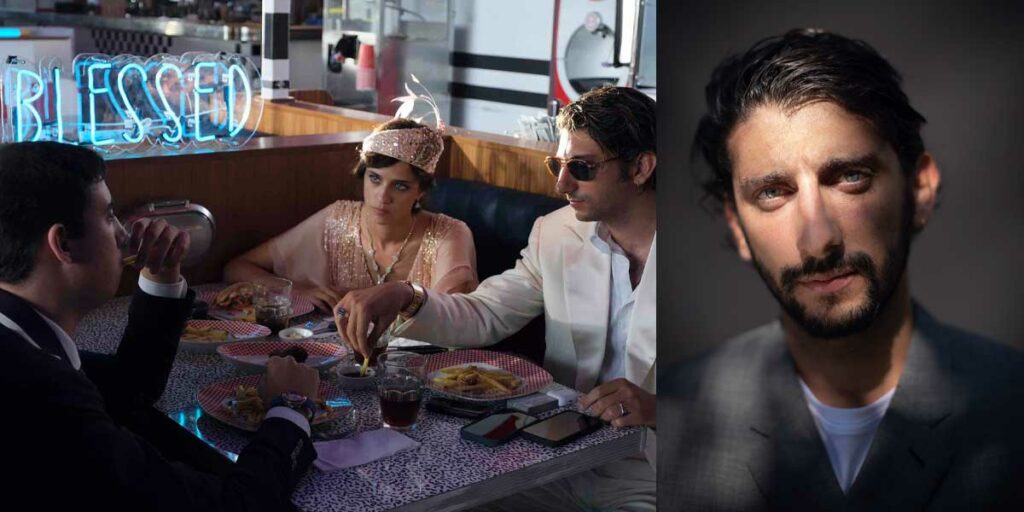We interview writer-director-star Pietro Castellitto on Enea, his Venice-premiering film about characters who “make up a war in order to feel life.”
“I still have hope,” says Valentino (Giorgio Quarzo Guarascio), one of the protagonists of Pietro Castellitto’s Enea, in the very first line of the movie. And yet, it also feels like the characters we meet in the film — two lifelong friends who are determined to “resist life’s events” and “befriend rage” in a world that seems to be set against them — are already doomed. At its core, the Venice-premiering and Luca Guadagnino-produced Enea is a tragedy, but it’s also a snapshot of Rome (and of Italy as a whole) as a place of both violence and poetry, where chaos and irony combine to show us the contradictions that define the human experience, and the mechanisms we put in place to survive.
At the centre of it all are the titular Enea (Pietro Castellitto), a young sushi restaurant owner from a bourgeois family, and his best friend Valentino, who’s recently become an aviator. The two of them have a drug dealing business on the side, but the film, which the writer-director-star defines as a “gangster movie without the gansters,” isn’t concerned with showing us every detail of their criminal endeavours. Instead, we are given key moments of their own lives and those of their family and friends — or, in Enea’s words, their “clan”: a bunch of people joined by a common purpose — as they strive to feel alive and find magic in the most ordinary moments.
There’s an ever-present undercurrent of danger in Enea, as we are always aware of the things we aren’t shown, but there’s also a deep awareness of how transient life is, and how important it is to experience each moment. Enea is firmly rooted in the present, unfolding before us and inviting us to live in the moment with its protagonists: Enea and Valentino, but also the former’s parents Celeste (Sergio Castellitto) and Marina (Chiara Noschese), who have each developed strategies to handle their unhappiness on their own, his quietly rebellious brother Brenno (Cesare Castellitto), his girlfriend Eva (Benedetta Porcaroli), and Giordano (Adamo Dionisi), a disillusioned drug dealer with a heart of gold.
Enea had its World Premiere at the Venice Film Festival, and we spoke with writer-director-star Pietro Castellitto about, the origins and themes of the film, the Venice premiere, characters who “make up a war in order to really feel life,” and more. Read the interview below!
Pietro Castellitto on Enea‘s Origins and Characters
Congratulations for the Venice premiere of Enea! I loved the film. There’s a line where the characters say that they’re “attempting to resist life’s events”. What motivates your characters?
Pietro Castellitto: All these characters are basically trying to feel alive, each in a different way: the younger characters obviously have different ways to do that than the older ones. Enea, the protagonist, is a dreamer. He yearns for a world where he can really love, feel the movement of life within himself, and make life become a place that lives up to his own ambitions. The paradox is that we feel life best when we’re at war, and they’ll all be forced to make up a war in order to feel life.
This is what all of these characters have in common: their desire to feel alive. I find my characters as I write the film, without judging them morally. If you love every single character you write, they’ll be the ones picking up the pen and continuing the story for you, eventually. And when some of these threads start to complete one another, you also come up with these perfect sentences that you never thought you could think of. It’s as if those words didn’t really come from you: you kept writing, and the characters wrote themself. Really, it’s as if you shouldn’t take the credit for it.

How long did it take you to write Enea?
P. C.: A few months.
Not long at all!
P. C.: Yes, but there’s also the immeasurable time you spend conjuring up these ideas, and I’ve been thinking about some of them for a long time. Then comes the actual writing. I usually write two drafts of the same story: I always think the first one is the final one, but it’s hardly ever true. The story needs time to really take shape.
The Themes of Enea, a “Gangster Story without the Gangsters”
I’ve heard you describe the film as a “gangster story without gangsters”: I love that idea! It’s so true, because we only get glimpses of Enea and Valentino’s drug dealing, but we still understand how it affects their lives.
Pietro Castellitto: It’s the point of view of the audience: I wanted it to be the point of view of someone who oversees drug trafficking. The characters’ criminal life is not shown in depth because it didn’t seem the right time to make a gangster film: so many absolute masterpieces have been made in the past. So, I made a film about the consequences of that on their everyday lives, and the discomfort that comes from keeping such company instead. It’s as if, underneath Enea, there was actually a gangster movie that the viewer never gets to see. But then, suddenly, once in a while, that part emerges, taking them by surprise.
It’s the same with death [spoiler for the rest of the paragraph!]: to me, Giordano’s [a sympathetic drug dealer, played by Adamo Dionisi] death is emblematic of this: when you die, even if you lead that kind of life, it’s not as if you kow that you’re about to die. So when death does come, it’s sudden and unexpected.
I’ve noticed that flying is such a recurring theme in Enea, from the fact that Valentino is an aviator to scenes involving mosquitoes and seagulls, and others that alienate us. For example, there’s a beautiful shot of the lit-up Earth seen from the Moon, and also some objects and people who actually fly.
P. C.: I think that every era has all the stories of the world within it. But it’s the symbols that allow a story to capture its own time better than others. So I tried to create a symbolism that could be tied to a place like Roma Nord. There, in every place, where there’s wellbeing there can also be paralysis. What matters is trying to be symbolic, but never rhetorical.
It’s funny, because when I found out that I was going to interview you, I thought of the character you play in Freaks Out: someone with the superpower to control animals but who doesn’t “work with bees” because they “piss [him] off”. And then, in this film, there’s a mosquito!
P. C.: The mosquito, which sometimes can be heard in Enea and his family’s house, is sort of an invisible problem that prevents the characters from really communicating with one another. Maybe they’re about to say something true to each other, but then they hear it, and this interrupts their conversations. At some point, it looks like the mosquito might be dead, but it’s actually been freed instead — and Enea will do the same thing with Oreste Dicembre [an investigative journalist played by Giorgio Montanini].

Casting Choices and Soundtrack in Enea
What was it like to work with your family? [Father and brother Sergio and Cesare Castellitto, who also play Enea’s father and brother in the movie]
Pietro Castellitto: It was a great way to get to know each other! You really get to know people when you work with them in formal environments: it allows you to set aside all the history.
How did you find Giorgio Quarzo Guarascio, who plays Valentino?
P. C.: When I was writing, I had other actors in mind, but the script wasn’t taking off. And then one day, I heard one of Giorgio Quarzo Guarascio’s songs: he’s a musician that my sister helped me discover. I’ve heard this beautiful song and I decided to watch an interview where I could watch him talk. And, well, I knew right away that there was a “temperature” within him that didn’t exist in the Italian cultural landscape. He seemed to have come out of a Bret Easton Ellis novel! This pleasing, mysterious, educated, amoral voice.
So one day I called him and arranged to have lunch with him. From then on, I started writing the script thinking of him for the character, and then we had a series of auditions in restaurants. We’d have lunch and have a few glasses of wine, and then I’d start to film him and we’d try out some lines.
I love that he sings in the film. The soundtrack is so beautiful too.
P. C.: Yes, the original score was made by Niccolò Contessa, who’s also a producer for many great bands. He made a sensational score that feels like it embodies the characters’ secrets. That extreme youth that’s corrupt but also romantic, and magical.
As for the songs we used in the film [such as Italian classics like Renato Zero’s “Spiagge” and Gianni Pettenati’s “Bandiera Gialla,” but also international hits like Belinda Carlisle’s “Heaven Is a Place on Earth” and Alphaville’s “Forever Young”], we tried to trace the spirit of the characters: they’re very nostalgic songs.
The Venice Premiere of Enea and What’s Next for Pietro Castellitto
Are you working on anything at the moment?
Pietro Castellitto: I wanted to start working on my third film, but I think it’s best to close this chapter first.
What was it like to watch the film at the premiere, with an international audience?
P. C.: It was great! I perceived a lot of love. I was very curious to find out what the audience was going to feel. I thought it was going to be a divisive film, but maybe it’s less divisive than I was expecting it to be.
Why did you think it would be divisive?
P. C.: Because I’m used to filming what I like, without compromising. So there are always going to be people who see life in a different way from you: the more direct you are, the more you risk people detesting what you do.
I loved the film, and I’ve spoken with a lot of people who agree with me. Of course, I’m not from Rome, so I’m sure I didn’t catch all the references…
P. C.: That’s true, but maybe, even if the places Enea goes to are elitist, that desire to feel alive applies to many young people.
I agree: it’s universal.
This interview has been translated from Italian.
Enea premiered at the Venice Film Festival on September 5, 2023.

